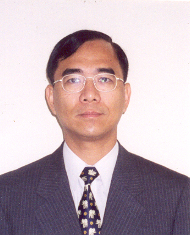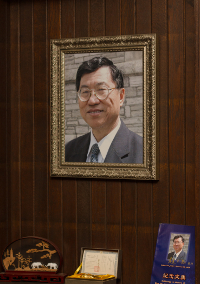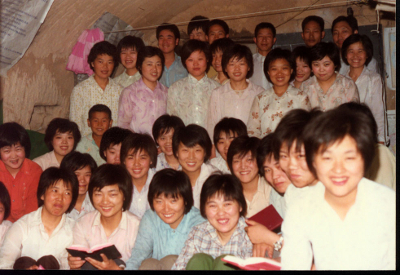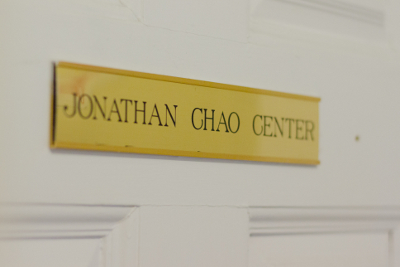|
|
Remembering Dr. Jonathan ChaoJanuary 22, 2014By Alumnus Ronald Yu (Th.M. '91) On January 12, 2004, Rev. Dr. Jonathan Chao (M.Div. '66) died of lymphoma. As we look back ten years from his death on the life and legacy of the man who was an instrumental part of assisting house churches in China, alumnus Ronald Yu provides his perspective on serving the Lord in Communist China with Dr. Chao. Westminster and the China ConnectionBy Ronald Yu (pictured below)
Jonathan’s vision for Chinese theological education was cultivated at Westminster when he was enrolled as M.Div. student in 1966. He gathered a core group of Chinese students on campus in preparation for a new seminary in Hong Kong, the China Graduate School of Theology (CGST). The core group consisted of Wilson Chow (who later became the President of CGST), Chebin Tan (who has served as President of China Evangelical Seminary in Taiwan) and Samuel Kao who were Jonathan’s classmates at Westminster. At that time, Bible schools in Hong Kong and Taiwan were all started and administered by western missions. There was a great need for a graduate level Chinese seminary administered by Chinese church leaders. Jonathan’s vision was realized ten years afterwards when CGST was established in HK in 1975. To deepen his understanding of contemporary China and the Chinese church, Jonathan switched from Th.M. studies at Westminster to oriental studies at University of Pennsylvania. His Ph.D. dissertation was on Christian response to the anti-Christian movement in China in the 1920’s that was instigated by the newly formed Chinese communist party. This academic training in research and writing on contemporary China and the church prepared him for a life-long engagement in pioneering ministries in China since her opening up in 1978. In response to the opening up of China, he started the Chinese Church Research Center (CCRC) in 1977 under CGST. Because of rapid growth of CCRC’s ministries and political sensitivity of China research, it became an independent organization soon after. By interviewing Christians and church leaders in China, Jonathan provided firsthand and update reports of the status of the Chinese church through CCRC’s publications: weekly China News and Church Report, bi-monthly China Prayer Letter and China and the Church Today magazine. He was a prolific writer and inspirational speaker on China and her church. Oversea Christians were excited to learn that the church in China had experienced revival during the Cultural Revolution. The number of Christians and house-churches increased by leaps and bounds in spite of severe persecution. To meet their tremendous needs, various ministries were developed at CCRC in response: publication and delivery of Study Bible and Training Manuals, broadcasting of theological courses called “Seminary of the Air”, recruiting and sending of mission staffs to train house-church believers and workers. By 1984, expansion of CCRC’s ministries in China led Jonathan to the vision of a new seminary for China. He often told his team that theological education was his first love. After three years of preparation, the Chinese Mission Seminary (CMS) was established in Hong Kong with the threefold vision for China: evangelization of the Chinese people, “kingdomization” of the Chinese church and Christianization of Chinese culture.
I inherited the burden for China through theological education from Jonathan. After I became a Christian at Northwestern University as an undergraduate student in Electrical Engineering, I attended a Christian student conference during Christmas of 1974. There I attended Jonathan’s workshop on China one afternoon, and received the calling for China at the last evening session. He was also the one who counseled me to return to Hong Kong for theological training at CGST, the first seminary he founded. I was one of the first class of graduates there. When Jonathan caught the vision in 1984 to start another seminary, he remembered my calling for China. He invited me to join the founding core group and sent me to Westminster for Th.M. studies after two years of involvement in China ministries. Even before we started our training program, we helped start one in China quite unintentionally. I remember meeting a house-church leader with Jonathan in China and shared with him our vision to start a seminary in Hong Kong to train workers for China. He was very grateful to the love and support of Christians from overseas, and felt ashamed if the church in China did nothing to train up Christians locally. He responded with the determination to do the same thing in China within their limited strength and resources. It took Jonathan ten years of preparation to start CGST and three years to start CMS. It took just 6 months for the leader in China to start the “Seminary of the Field.” I believe it was first of its kind in communist China. It was a three-months’ intensive Bible teaching program followed by cross-provincial itinerant preaching and house-church planting. The design and rhythm of the program fit in the rural setting perfectly. It resulted in rapid church growth and multiplication of such training sites rolled across central China like a snowball. In two years, one site in one province multiplied to seven in three neighboring provinces. Thirty to a hundred students were trained at a time and sent out afterwards. I had the privilege to visit some of these sites and teach there at their initial formative stage. Security was of utmost concern on a ministry trip with the underground house-churches. To avoid being tracked and monitored, we could not contact each other by phone or mail. I had to take a 30-hours train ride instead of 2 hours flight, and stayed in pre-arranged Christian home instead of a hotel during a stop-over. We set a certain dress code to recognize each other at the train station. At that time, incoming visitors needed to switch to the local dress format removing items like spectacles, wrist-watches or shoes that revealed our foreign status especially when we left the city and entered the rural area. Security measures still need to be observed today, though not as stringent as before.
I waited in a Christian home until dark before being escorted to the rural site. Though my escort had a flashlight, he turned it off to avoid being noticed by neighbors. It was the first time I walked in the dark, not by sight but by faith following the sound of my escort’s footsteps. The first site I entered was literally underground, a cave filled with 60 young Christians. I was told that a cave could be excavated by twenty men laboring over twenty days. That was where they slept at night and had classes in the daytime for three months. They could sing and pray aloud in the cave without being overheard by neighbors. There were neither desks nor chairs, only small stools to sit on. Some sat on the ground covered by straw mats. I was humbled by their simple setup and inspired by their hunger for God’s word. I would preach for hours in the morning, afternoon and evening. My most favorite course I taught was on Kingdom discipleship in the Gospel of Matthew. Though rural peasants were not good at taking notes, they prayed for an hour after a lecture and hammered God’s word into their hearts through prayers. No wonder that they could preach and teach the same message afterwards, and spread God’s word like wildfires through the countryside. Two coworkers accompanied me on the 30-hours return trip on the train. They had ample time to share with me God’s miraculous work in and through the house-churches, and pointed out on the provincial maps where they had traveled and multiplied believers and churches on the way. I had the first glimpse of the ingredients of spiritual revival in China: itinerant preaching, perseverance through suffering, fervent prayers, passionate repentance, scripture memorization, house-church multiplication, mission-sending and theological training. The most urgent need of the hour for the church in China appeared to me to be theological training, and it is of growing importance since then. Field experience in China convinced me the importance of theological training for missions. I was thrilled to have Jonathan as mentor in fulfilling God’s calling on me for China through theological education. My Th.M. studies at Westminster was short but fruitful. I finished my coursework in one year and hurried back to Hong Kong to start CMS. My thesis, the Role of the Cross in the Process of Sanctification, was completed four years later. I had a Korean roommate at Westminster. He helped me to get excellent course notes on M.Div. courses from his Korean student network, as my reference materials for future teaching. One Korean student had received the China calling also. He had set up a China prayer meeting for Korean students and invited me to share my experience. Later, he set up a mission agency which sent him out as the first missionary to China. He taught English as a tentmaker. Later he started a M.Div. program and we became partners in theological education in China. Besides establishing CMS with the threefold visions for China, Jonathan set up China Ministries International (CMI) as the international mission body to recruit, train and send missionaries to China from various countries beginning first with a USA office in the US Center of World Mission in Pasadena. Soon after, regional CMI offices were established in seven other countries, with the same threefold visions. His last investment in theological education was to start the M.Div. program in China in 2001. He went to be with the Lord in 2004 with the unfinished dream of establishing seven seminaries over seven major regions in China. Theological education is still the most critical area for a healthy growth of the church in China. Westminster’s academic excellence in Reformed Apologetics and Systematic Theology, Biblical Counseling and Urban Ministry, Hermeneutics and Church History, can help produce the next generation of qualified theological educators for the emerging seminaries in China. I am encouraging young Mainland Chinese Christians to pursue advance theological education in Westminster and hope that these graduates may upgrade the quality of theological education in China. May Westminster’ China connection widen and deepen for the consolidation of theological education in China! I was told that President Peter Lillback is planning to set up a Jonathan Chao’s Chair at Westminster. We are excited to hear that because in this way, Jonathan’s contribution to Chinese theological education may continue not only through our CMI family but also through Westminster, his Alma Mater.
|







 I went to Westminster for Th.M. studies in 1986 to equip myself for theological education ministry in Hong Kong and China. In 1984, I was invited by Dr. Jonathan Chao, also an alumnus of Westminster, to help start the Chinese Mission Seminary (CMS) in Hong Kong. Jonathan was the Founder and first President of CMS and my mentor in theological education ministry. Since then, I got involved in theological training with house-churches in China. Jonathan was a gifted visional leader for Chinese theological education starting the first graduate-level seminary for the Chinese church (China Graduate School of Theology in 1975), the first missional seminary for China (Chinese Mission Seminary in 1987), and ultimately an M.Div. program for the house-churches in China (China Theological Seminary in 2001). It was through his recommendation that I got scholarship support for Th.M. studies at Westminster in 1986 before starting CMS a year later. Following is the story of our engagement in theological training ministry for China and in China.
I went to Westminster for Th.M. studies in 1986 to equip myself for theological education ministry in Hong Kong and China. In 1984, I was invited by Dr. Jonathan Chao, also an alumnus of Westminster, to help start the Chinese Mission Seminary (CMS) in Hong Kong. Jonathan was the Founder and first President of CMS and my mentor in theological education ministry. Since then, I got involved in theological training with house-churches in China. Jonathan was a gifted visional leader for Chinese theological education starting the first graduate-level seminary for the Chinese church (China Graduate School of Theology in 1975), the first missional seminary for China (Chinese Mission Seminary in 1987), and ultimately an M.Div. program for the house-churches in China (China Theological Seminary in 2001). It was through his recommendation that I got scholarship support for Th.M. studies at Westminster in 1986 before starting CMS a year later. Following is the story of our engagement in theological training ministry for China and in China. Once again, Jonathan’s dream would not have come true in three years without the support from Westminster. Scholarship support was provided for CMS’ faculty development. The current President of CMS, Dr. Siu Sing Fung, received his Ph.D. in Hermeneutics at Westminster. After he graduated from CGST, he joined CCRC and wrote courses on hermeneutics for broadcasting before his advance study at Westminster. I got my Th.M. in Systematic Theology at Westminster and serve now as Vice President of CMS. Both of us got scholarship from Westminster through Jonathan’s recommendation.
Once again, Jonathan’s dream would not have come true in three years without the support from Westminster. Scholarship support was provided for CMS’ faculty development. The current President of CMS, Dr. Siu Sing Fung, received his Ph.D. in Hermeneutics at Westminster. After he graduated from CGST, he joined CCRC and wrote courses on hermeneutics for broadcasting before his advance study at Westminster. I got my Th.M. in Systematic Theology at Westminster and serve now as Vice President of CMS. Both of us got scholarship from Westminster through Jonathan’s recommendation.
